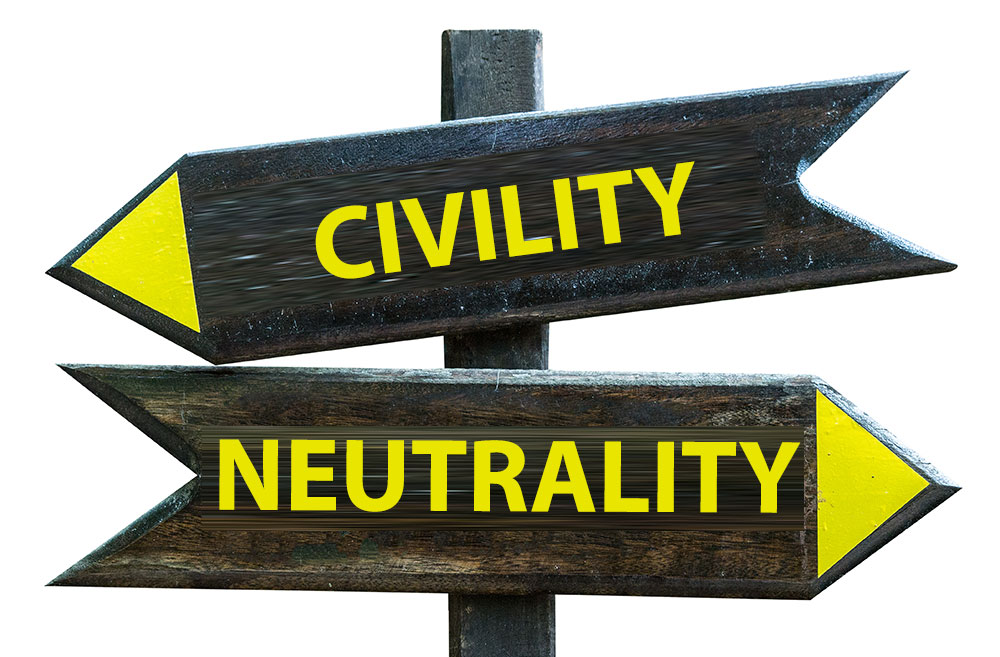This week…seems like a good moment to untangle a common confusion the undercuts the efforts to depolarize our politics: The confusion between civility and neutrality
This confusion is demonstrated in the editorial below by April Holm when she writes: “Calls for moderation and civility… take the focus away from injustice and put it instead on the behavior of those protesting it.”
Ms. Holm is correct that there are many examples where false equivalency under the guise of “fairness” has meant acquiescing to the wrong— even evil — side. As she puts it, taking a “very fine people on both sides” approach. But striking the pose of noncommittal moderate neutrality is not the same as maintaining rational civil discourse.
Being able to hold and passionately argue strong opposing views is a cherished and essential part of a free society. The specific problem of polarization is not that there are two strongly opposing sides to a debate. The problem of polarization is that it poisons the debate by infecting it with an element of fundamentally irrelevant emotional rancor that makes it impossible to hear the other side…and thereby rationally argue—and judge—for or against it. Dr. King was hardly neutral or moderate in his fight for rights. But he was always civil. He ultimately succeeded not by name calling, seducing, trivializing, bullying and the other flags of polarization listed above. He succeeded by eloquent, passionate but still civil rational discourse.
Politics is about resolving deeply important values and rights which often come into conflict with other, perhaps equally important values and rights. Polarization stultifies the civil discourse needed to untangle and resolve those complex conflicting issues…which is not the same as bland neutrality. In the words Michael Ignatieff, speaking about resolving conflicts in the area of human rights:
Human rights might become less imperial…if it were understood as a language, not for the proclamation and enactment of eternal verities, but as a discourse for the adjudication of conflict…. A belief in human rights is not a faith like a religion, and the authority it confers is not the authority of faith, only the authority of argument… To be a rights bearer [thus] is not to hold some sacred inviolability but to commit oneself to live in a community where rights conflicts are adjudicated through persuasion… The fundamental moral commitment entailed by rights is not to respect, and certainly not to worship. It is to deliberation.
Centrism and moderation? No thanks.
April Holm, The Washington Post February 27, 2019
The nascent Democratic presidential primary offers voters two paths: moving to the left to energize the party’s base or picking someone who offers the promise of crossover appeal to the many voters who loathe Donald Trump but who find the left’s stances too extreme, or too much too soon.
As the country has polarized over the past five decades, the center has real political appeal. With the two parties sorted between conservatives and liberals and with a political press that practices both-sides coverage and paints each base as equally extreme, centrism and moderation seem to offer a way out of polarization and partisanship. And it promises something more: a politics driven by neutrality and civility, not crassness, passion and demonization of the opposition.
This is nothing new. Calls for moderation and civility, combined with denouncing both sides as too extreme, are common in moments of moral and political crisis. But they are not apolitical. They take the focus away from injustice and put it instead on the behavior of those protesting it. This allows critics to adopt a moral high ground as the civil, reasonable ones without ever publicly taking sides in the debate. But as our own past has shown, neutrality in times of moral and political crisis is anything but neutral.
In the years before the Civil War, Americans were embroiled in another moral and political crisis: the conflict over the future of slavery. Then, as now, the heated political showdown made people uncomfortable. In an attempt to avoid this discomfort, many hoped to navigate the crisis as neutral parties, taking a “very fine people on both sides” approach to the slavery debate. But as it turned out, remaining neutral in the end amounted to defending slavery.
Neutrality was particularly appealing in places that were deeply politically divided. During the slavery debates and then the Civil War, the border states were the most divided part of a divided nation. Abolitionists, pro-slavery advocates, Unionists and Confederate sympathizers all rubbed shoulders, and sometimes came to blows.
Churches in particular bore the brunt of the region’s divisions. Congregations erupted into chaos, first over slavery and then over secession. The clergy who led these congregations, desperate to keep them together, often attempted a strategy of neutrality. They argued that slavery was a purely political issue, not a moral concern. They rejected abolitionism as unseemly radicalism, and they congratulated themselves for standing above the fray. As one Kentucky Presbyterian put it, “By our superior moderation [we] put ourselves clearly in the right.”
Their story illustrates both the appeal and the folly of such an approach.
Time and again, white clergy on the border pointed to the heated debate over slavery, rather than slavery itself, as the major problem facing the nation. They were concerned more with preserving civility and harmony in their congregations than they were with human liberty or the evil of slavery. To maintain harmony, they discouraged abolitionism as too extreme and argued that the church had no place promoting equality and freedom or opposing racism and slavery.
In theory, this was neutrality. In practice, it was pro-slavery. Despite the efforts of abolitionists, the laws of the United States protected slavery. Avoiding the subject helped to keep slavery alive.
When slaveholding states responded to the election of Abraham Lincoln by seceding from the Union, internal conflict only escalated in border-state churches. Unionists and Confederate sympathizers clashed in the pews. Again, clergy sought to remain neutral in hopes of forestalling conflict. But neutrality — and the pretext it was built upon — could not survive the end of war. Confederate defeat and the abolition of slavery eliminated the possibility of neutrality for border clergy.
Having insisted on the moral superiority of neutrality for decades, border clergy found it hard to drop their stance, even with slavery abolished. After years of insisting that their moderation gave them the moral high ground, these neutral clergy felt victimized when their churches finally acknowledged that slavery was a sin.
Their sense of persecution led them out of the Northern branches of their denominations after the war and into the Southern branches, which had separated before the Civil War in defense of slavery. Leaders of these churches continued to insist that slavery had been a godly and beneficial system, even long after it was abolished. They also continued to place blame for the nation’s woes on abolitionists — just as the border clergy did.
This was an ironic turn, given that border clergy had initially made such an effort to avoid division over slavery and prioritized civility, moderation and the preservation of denominational unity. Now, they aligned with the very forces keeping the debate alive long after its outcome had been decided.
Ultimately, remaining neutral in the debates over slavery and secession proved ineffective. Still, it is not difficult to understand the appeal of neutrality in the face of divisive moral and political conflicts. Border moderates were profoundly disturbed to see debates over slavery and secession disrupt the peace of their churches and denominational institutions. As a result, they came to view abolitionists and the debates they provoked, rather than slavery itself, as the most pressing problem they faced.
In the polarized landscape of the mid-19th century, political arguments could generate explosive conflict. Within this context, attempting to remain neutral was not only attractive — it began to feel virtuous. Thus, moderate white border clergy convinced themselves that they were morally superior to those who engaged in partisan debates. They could not see that their ability to dismiss the slavery debate as a purely political matter was an option not available to everyone. (African Americans, for example, had no such luxury.)
This attempt by moderates to remain neutral in the face of moral disputes reverberates in present-day conflicts. It reveals why many people turn to neutrality as a strategy in times of turmoil. And it explains why remaining neutral can feel like taking a principled stand. This is the logic of those who advised a “go-slow” approach in response to the civil rights movement during the 1950s and 1960s. And indeed, of those who respond to the Black Lives Matter movement with the rebuttal “All Lives Matter.” It is the logic of calls to prioritize civility in public exchanges and of the insistence on seeing moral equivalence on both sides of every debate.
These responses are available only to those who are not, themselves, marginalized. And they are, as Martin Luther King Jr. warned when he criticized white moderates, the refuge of those who are “more devoted to ‘order’ than to justice; who prefer a negative peace which is the absence of tension to a positive peace which is the presence of justice.”
Source: The Washington Post · by April Holm · February 27, 2019




